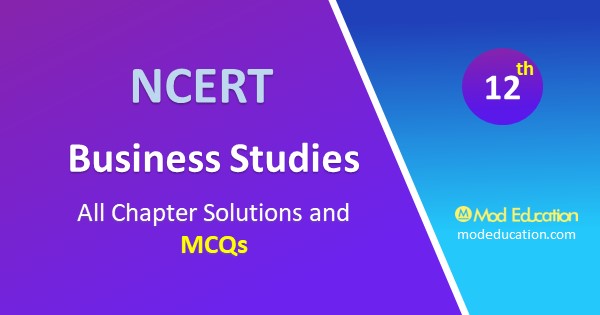MCQs for Class 12 Business Studies Chapter 7 : Class 12 BSt MCQs for Business Studies Chapter 7 ” Directing ” with Answers PDF Free Download is very important for students. CBSE Class 12 Business Studies Multiple Choice Questions with Answers to improve your score in Board Exams. Class 12 BSt All chapter MCQs

MCQs for Class 12 Business Studies Chapter 7 Directing with Answer PDF | Class 12 BSt All chapter MCQs
Q.1 Which one of the following is an element of directing?
(a) Delegating authority
(b) Designing organisation structure
(c) Communication
(d) Designing control system
(c) Communication
Q.2 Motivation is not
(a) a complex process.
(b) related to satisfaction
(c) an easy process.
(d) a goal-directed behaviour
(c) an easy process.
Q.3 Need hierarchy theory of motivation has been given by
(a) Maslow.
(b) Fayol.
(c) Taylor.
(d) Koontz.
(a) Maslow.
Q.4 Which one of the following is not a financial incentive?
(a) Bonus
(b) Provident Fund
(c) Co-partnership
(d) Challenging job
(d) Challenging job
Q.5 Which one of the following is a non-financial incentive?
(a) Recognition
(b) Perquisite
(c) Retirement benefit
(d) Stock option
(a) Recognition
Q.6 Leadership is based on a superior’s
(a) authority.
(b) responsibility
(c) accountability.
(d) pesuasive Communication
(a) Recognition
Q.7 Encoding is related to
(a) converting message into symbols.
(b) converting symbols into machine
(c) transmitting message.
(d) receiving symbols
(a) converting message into symbols.
Q.8 Grapevine is a form of
(a) formal communication.
(b) channel of communication
(c) informal communication.
(d) barrier to communication
(c) informal communication.
Q.9 Which one of the following is a semantic barrier?
(a) Organisational policy
(b) Lack of attention
(c) Technical jargon
(d) Status
(c) Technical jargon
Q.10 _ is the process of stimulating people to engage in goal-directed behaviour.
(a) Communication
(b) Motivation
(c) Directing
(d) None of these
(b) Motivation
Q.11 It is very difficult to detect the source of such communication.
(a) Upward communication
(b) Vertical communication
(c) Lateral communication
(d) Informal communication
(d) Informal communication
Q.12 Which of the following is not a type of semantic barriers?
(a) Badly expressed message
(b) Unclarified assumptions
(c) Technical jargon
(d) Premature evaluation
(d) Premature evaluation
Q.13 Which of the following is not a type of psychological barriers?
(a) Premature evaluation
(b) Lack of attention
(c) Fear of challenge to authority
(d) Distrust
(c) Fear of challenge to authority
Q.14 Which of the following is not a type of personal barrier?
(a) Fear of challenge to authority .
(b) Unwillingness to communicate
(c) Loss by transmission and poor retention
(d) Lack of proper incentive
(c) Loss by transmission and poor retention
Q.15 It refers to the process of instructing, guiding, counselling, motivating and leading j people in the organisation to achieve their objectives.
(a) Planning
(b) Organising
(c) Staffing
(d) Directing
(d) Directing
Q.16 Which of the following is not an element of directing?
(a) Supervision
(b) Communication
(c) Leadership
(d) Inspection
(d) Inspection
Q.17 The channel of communication which is transmitted through informal channels is called _
(a) Horizontal communication
(b) Formal communication
(c) Grapevine
(d) Gang plank
(c) Grapevine
Q.18 _ aims at instructing, guiding, motivating people to achieve the desired results.
(a) Communication
(b) Directing
(c) Motivating
(d) Organising
(b) Directing
Q.19 _ is the process of converting a message into symbols.
(a) Encoding
(b) Decoding
(c) Coding
(d) Both (b) and (c)
(a) Encoding
Q.20 Directing flows in _ direction.
(a) Upward
(b) Downward
(c) Diagonal
(d) Both (a) and (c)
(b) Downward
Q.21 Identify the style of leadership in which the superior uses file forces from within the groups in order to establish control.
(a) Autocratic leadership
(b) Democratic leadership
(c) Laissez-faire leadership
(d) Authoritarian leadership
(b) Democratic leadership
MCQs for Class 12 Business Studies Chapter Wise with Answer PDF | Class 12 BSt All chapter MCQs
MCQs for Class 12 Business Studies : NCERT CBSE RBSE and Other State Board Business Studies MCQ Questions for Class 12 with Answers is one of the best ways to prepare for the CBSE Class 12 board exam. Class 12 BSt All chapter MCQs
